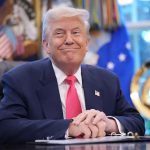On Feb. 23, Steven Mosher, president of the conservative Population Research Institute, had a commentary piece published in the New York Post regarding the origins of the novel coronavirus in China.
He wasn’t entirely convinced of the official origin story, infected bats being sold or eaten at a wet market in the Chinese city of Wuhan.
Instead, in the piece, he argued that the origin of the virus might be from an accident or unauthorized leak from a laboratory in Wuhan.
As the Post noted in an editorial published Friday, “Mosher cited a host of suggestive facts, including urgent government directives, the sudden trip of China’s top biowar expert to Wuhan and that nation’s shoddy record of lab safety — as well as gaping holes in the wet-market explanation, such as the fact that the market in question doesn’t sell bats, the animal from which the bug supposedly jumped.”
This was fairly persuasive stuff, presented weeks before the rest of the media started covering it — and not just the conservative outlets, which we’ll get to in a bit. It was an opinion column, albeit one written by a persuasive individual who knew quite a bit about the subject. What could be wrong with that?
Plenty, at least to Facebook, which made sure the story’s distribution was cut way down.
Trump warns UK it’s ‘very dangerous’ to do business with China after Starmer’s Beijing meeting
Trump administration eases sanctions on Venezuelan oil industry after Maduro’s capture
Video: Anti-ICE Agitators Say Video of Woman Writhing in Pain Shows ICE Blew Part of Her Hand Off, But Look What We Found When We Slowed It Down
CNN’s Navarro Calls Pretti ‘Perfect Guy’ She’d Want Daughter to Date Before Disturbing New Video Surfaces
Dems provide Republicans key votes to advance Trump-backed funding package
Hunter Biden Argues He’s Not Legally Obligated to Communicate with His 7-Year-Old Daughter in New Court Filing
Trump files $10B lawsuit against IRS over alleged tax return leaks to major news outlets
Social justice advocate once named Bostonian of the Year sentenced in fraud case
Man Arrested While Allegedly Attempting to Break Luigi Mangione Out of Prison by Posing as an FBI Agent
Judges weigh Title IX funding fight over Virginia schools’ pro-transgender bathroom policies
Anti-ICE agitators mistake TSA air marshals for ICE agents, heckle them at Los Angeles-area restaurant
‘Zizian’ suspect to represent self at trial as other associates derail murder case
Dem Governor’s Attempt to Frame JD Vance’s Holocaust Remembrance Day Post as Anti-Semitic Backfires
Virginia Democrats seek dozens of new tax hikes, including on dog walking and dry cleaning
FIRST ON FOX: FEMA unleashes $2.2B in disaster relief funding across 25 states: ‘Cutting red tape’
“The social media giant’s ‘fact-checkers’ decided this was not a valid opinion. If you tried to share Mosher’s column on Facebook, the social network stuck a ‘False Information’ alert on top, saying that finding was ‘checked by independent fact-checkers’ and preventing your friends from clicking to connect to the original article to see for themselves,” the Post editorial board wrote in Friday’s piece, describing what can only be called censorship by the social media giant.
“Again, this was an opinion column, not a news report,” the editorial continued.
“How, exactly, did Facebook determine that Mosher’s reasoned arguments constituted ‘False information’? Well, in fact, it didn’t so determine: Rather, it was an ‘independent fact-checker.’”
That independent fact-checker’s piece, rather unbelievably, used information from an individual who “had a clear conflict of interest: She has regularly worked with Wuhan’s researchers, and even done her own experiments there,” the Post wrote.
“Danielle E. Anderson, assistant professor, Duke-NUS Medical School in Singapore, personally attested to the lab’s ‘strict control and containment measures.’
“Anderson did admit, however, that Mosher was correct when he mentioned that SARS did twice escape a Beijing research lab in 2004,” the Post editorial added.
See if you can spot the problem in the evaluation of things by the second expert cited in the “fact-check” piece. This expert was disputing Mosher’s suggestion that the Chinese Ministry of Science and Technology’s directive to labs to increase security measures amid the coronavirus outbreak might be evidence that the government knew sloppiness played a role in the outbreak’s origins.
“Any responsible government would strengthen safety and security procedures in high-containment labs that will and should be working with the novel coronavirus to develop countermeasures and diagnostics,” the expert told the fact-checker.
The Post was having none of that.
“Well, yes, any responsible government would,” the editorial board shot back.
Trump warns UK it’s ‘very dangerous’ to do business with China after Starmer’s Beijing meeting
Trump administration eases sanctions on Venezuelan oil industry after Maduro’s capture
Video: Anti-ICE Agitators Say Video of Woman Writhing in Pain Shows ICE Blew Part of Her Hand Off, But Look What We Found When We Slowed It Down
CNN’s Navarro Calls Pretti ‘Perfect Guy’ She’d Want Daughter to Date Before Disturbing New Video Surfaces
Dems provide Republicans key votes to advance Trump-backed funding package
Hunter Biden Argues He’s Not Legally Obligated to Communicate with His 7-Year-Old Daughter in New Court Filing
Trump files $10B lawsuit against IRS over alleged tax return leaks to major news outlets
Social justice advocate once named Bostonian of the Year sentenced in fraud case
Man Arrested While Allegedly Attempting to Break Luigi Mangione Out of Prison by Posing as an FBI Agent
Judges weigh Title IX funding fight over Virginia schools’ pro-transgender bathroom policies
Anti-ICE agitators mistake TSA air marshals for ICE agents, heckle them at Los Angeles-area restaurant
‘Zizian’ suspect to represent self at trial as other associates derail murder case
Dem Governor’s Attempt to Frame JD Vance’s Holocaust Remembrance Day Post as Anti-Semitic Backfires
Virginia Democrats seek dozens of new tax hikes, including on dog walking and dry cleaning
FIRST ON FOX: FEMA unleashes $2.2B in disaster relief funding across 25 states: ‘Cutting red tape’
The Post is right, and the evidence is building that Mosher’s original piece might have been just as correct.
Other outlets have started to cover this story, too — some which aren’t necessarily predisposed to a conservative point of view.
As early as the beginning of April, Washington Post colunist David Ignatius — who is no friend of the Trump administration — ran a piece saying that the “initial origin story” behind the coronavirus outbreak was “shaky” and noted the fact that the Wuhan Institute of Virology had been working with bats and coronaviruses and raising the possibility that the coronavirus that has shut down the world’s economy and killed more than 160,000 as of Sunday morning, according to Johns Hopkins University data, started with a leak from the lab.
At least twice last week, The Washington Post mentioned the Wuhan Institute of Virology theory without dismissing it.
On Tuesday, the paper reported that U.S. Embassy officials which had visited the laboratory had cabled back on several occasions — including two official warnings — regarding inadequate safety procedures there.
And then on Saturday, the paper’s editorial board wrote this in a piece about how China’s dictatorial regime made things worse:
“A more troubling explanation is that the coronavirus was inadvertently spread from the Wuhan Institute of Virology, which had carried out research on bat coronaviruses and possessed a biosafety level 4 facility, the most secure for handling highly pathogenic and infectious diseases. It is not beyond possibility that an accident or spill occurred.” [Emphasis ours.]
On Friday, meanwhile, Fox News reported the United States was conducting an investigation into whether the virus originated at the Wuhan laboratory. Over the preceding few days, it had been reported that U.S. intelligence agencies were becoming increasingly convinced the virus had escaped from the facility.
Trump warns UK it’s ‘very dangerous’ to do business with China after Starmer’s Beijing meeting
Trump administration eases sanctions on Venezuelan oil industry after Maduro’s capture
Video: Anti-ICE Agitators Say Video of Woman Writhing in Pain Shows ICE Blew Part of Her Hand Off, But Look What We Found When We Slowed It Down
CNN’s Navarro Calls Pretti ‘Perfect Guy’ She’d Want Daughter to Date Before Disturbing New Video Surfaces
Dems provide Republicans key votes to advance Trump-backed funding package
Hunter Biden Argues He’s Not Legally Obligated to Communicate with His 7-Year-Old Daughter in New Court Filing
Trump files $10B lawsuit against IRS over alleged tax return leaks to major news outlets
Social justice advocate once named Bostonian of the Year sentenced in fraud case
Man Arrested While Allegedly Attempting to Break Luigi Mangione Out of Prison by Posing as an FBI Agent
Judges weigh Title IX funding fight over Virginia schools’ pro-transgender bathroom policies
Anti-ICE agitators mistake TSA air marshals for ICE agents, heckle them at Los Angeles-area restaurant
‘Zizian’ suspect to represent self at trial as other associates derail murder case
Dem Governor’s Attempt to Frame JD Vance’s Holocaust Remembrance Day Post as Anti-Semitic Backfires
Virginia Democrats seek dozens of new tax hikes, including on dog walking and dry cleaning
FIRST ON FOX: FEMA unleashes $2.2B in disaster relief funding across 25 states: ‘Cutting red tape’
So, no, this wasn’t fake news and hadn’t been for quite some time. That didn’t lead Facebook to reverse its decision until it quietly caved late last week. The reason, according to Post Op-ed Editor Sohrab Ahmari, was that Facebook simply rolled over once news of the censorship began leaking out:
POSTSCRIPT: After we raised the alarm, Facebook uncensored that Steve Mosher oped about the origins of the Wuhan virus. But the company didn’t apologize to the NYPost or offer any explanation/accountability. https://t.co/E9AhrFS9zz
— Sohrab Ahmari (@SohrabAhmari) April 18, 2020
“The New York Post has asked for weeks to get Facebook to un-block the Mosher article,” the paper’s editorial board wrote. “On Friday, the social network finally did so, though without acknowledging that it had been wrong all along.”
I wouldn’t be waiting for that apology. The only reason Facebook CEO Mark Zuckerberg’s minions reversed course that is because it became clear the company had censored legitimate commentary from a trusted publication.
In a better world, we could assume that social media giants would not censor opinions that are on topics of public interest that have evidence to back them up. The original Mosher piece was both of those things and it still got nixed — presumably because angering China doesn’t go over well for tech giants.
Neither does censorship, however. Will Facebook learn its lesson? Probably not.
Story cited here.
























